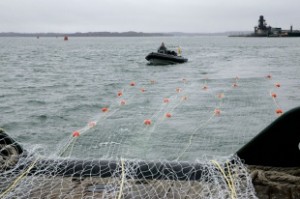Are your products getting to their market?
 By Richard Maino
By Richard Maino
Despite the best efforts of an international naval police force patrolling the Gulf of Aden and nearby seas, gangs of ruthless criminals can still capture highly valuable cargo ships and hold them to ransom.
Most vessels hijacked by the modern pirates in the busy shipping lanes off the coast of Somalia have to be “reclaimed” by their owners for an average of two million US dollars each.
In an attempt to prevent that, an imaginative private security company in the UK has developed a new product that it believes can halt or hamper today’s pirates who use small fast boats to board the large vulnerable and slow-moving vessels.
The novel defence system consists of a simple but strong net that can be draped over the stern or sides of a possible target vessel – creating a safety zone – and floated clearly on the surface for some distance to prevent the pirates getting their speed-boats close to the big ships they seek to capture.
In the years of anarchy that Somalia has suffered since its government was overthrown in 1991, thousands of pirates now operate off its coast. Somalia’s 3,000-kilometre coastline – the longest in Africa – has become one of the world’s most dangerous waterways. No ship is safe. Pirates have hijacked aid shipments, kidnapped crews, and have even fired rocket-propelled grenades at cruise ships.
The idea for the naval safety net came to Nick Davies, founder of the Anti-Piracy Maritime Security Solutions company – based in Poole, south-west England – after he noted the way in which powerboat propellers can be badly fouled by fishing nets.
He said: “In essence it [the anti-pirate system] is a fishing net that is deployed, then it floats on the water all around the ship and snags the propellers of any boats coming near it.” Sounds basic but effective? Ð “Yes, some times the easiest things are the things that do work.”
Davies believes the counter-piracy device will turn the tables on the high-seas criminals because any ship with the trailing nets is not going to be a target they would want to get close to for fear of ending up with a disabled boat.
The nets can be fitted to any vessel from the bow to a line level with the stern gear down the sides with six-metre steel booms holding the net away from the vessel. The stern net attaches across the full width of the stern and trails for 50 metres behind the vessel.
When not in use they can be safely stored on deck in their own containers. They can be deployed and recovered in fewer than 20 minutes. All the nets are fitted with orange warning buoys to act as a visual deterrent and to warn of danger.
Anti Piracy Maritime Security Solutions (APMSS) of Poole, Dorset, England, is a UK company established in 2008. Its director is Nick Davies, a former army pilot. The company says its goal is to provide for the safety and security of merchant ships as they make passage through the Maritime Security Patrol Area in the Gulf of Aden.
The APMSS team members have prior experience in a variety of fields, including UK Special Forces (Special Boat Service, anti-terrorist units), navy, army and police. Its interim deck-watch team provides non-lethal ship security through known high-risk piracy areas, using necessary equipment, including long-range acoustic device. APMSS provides early warning of a potential pirate attack.
More than 90 ships were attacked off the coast of Somalia in 2008 and many vessels – and crews – still remain in the hands of Somali pirates who are prepared to wait for months or longer while negotiating their ransom demands.
Tankers are an obvious target of opportunity, with an average cargo of 110 million dollars’ worth of crude oil. They are run with a small crew and a fully laden tanker is relatively easy to get on board from smaller fast boats, often sent out from a mother ship patrolling the seas to find victims. Experts estimate that the pirates and the warlords who run them have “earned” some 30 million dollars in ransom money in 2008.
Currently, the Nato alliance, the US Navy’s Fifth Fleet, and a host of other countries have ships patrolling the coast of Somalia and the Gulf of Aden – an area of about 2.84 million square kilometres (about 1.1 million sq miles) – to prevent piracy.



